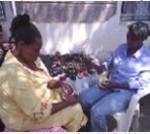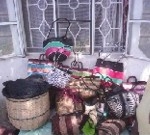Turning Waste to Wealth
It is said that birds of the same feather flock together. Mercy and Loice reflect the same feather in many aspects. Both of them are aged 42; they have three children each; they are all retirees and will not allow old age to stifle their entrepreneurial prowess. Hailing from Jamaa Estate in the outskirts of Kenya’s Nairobi city, the duo are members of Basket Weavers, Craft and Beadwork women group that was formed in 1997. From the experience they gathered in this group, they were able to form their own group known as NJAWAM. NJAWAM’S objective is to manage waste by converting it to productive use. They weave ciondos (baskets), mats and also make fireless cookers and jewellery from bones. Margaret Gachucha talks to them.
Mercy and Loice at their
workshop weaving
Margaret: Where is your office?
Loice: We operate from our house in Nairobi’s Jamaa estate. Our income level has not reached the point of renting an office in the city.
Margaret: Briefly describe a typical day in your life
Mercy: We wake up at 5.30 in the morning and jog for physical fitness. This takes thirty minutes. At 6 am, we go back to the house, do household chores and set breakfast for the rest of the family members. We start our craft work at 8 in the morning, break for lunch at 1 o'clock and terminate it at 4 in the evening.
Margaret: What were you doing before?
Loice: I was employed by the Kenya National Examination Council on contract while Mercy was a Kenya Industrial Estates' agent. Whereas she was retrenched, my contract was terminated. We enrolled with a local women’s group which carried a round table savings scheme or ‘merry go round.’ When we’d saved enough money, we enrolled for weaving and basketry lessons from another group of women at a fee of Kshs 2000 each.
Margaret: Where did you get your capital?
Mercy: From the little we’d saved from our former jobs and the merry go rounds. While in our places of work, the K-REP bank gave us lessons on the importance of making savings. We heeded this call. My initial investment was Kshs 800 while Loice’s was around Kshs 1800.
Margaret: What drove your passion for business?
Mercy: Though our jobs were terminated, we did not want to sit idle and depend entirely on our spouses for everything. Why do so when we still had energy and creative ideas? Business is no respecter of age!
Margaret: Whom do you target?
Loice: We target all customers interested in our taste. We make bags suitable for both men and women and children. Our hats are unisex. Our jewellery is ideal for both men and women and lasts longer than most jewellery in the market.
Mercy: We also target tourists for they pay good money for souvenirs from Africa.
Margaret: Where do you get your raw materials?
Mercy: We use dry banana stems, which we purchase from people upcountry; plastic paper bags are bought from a Plastics Savings cooperative (Plastic SACCO.) This SACCO buys paper bags thrown in garbage for Kshs. 5 per kg, cleans, dries and cuts them into neta strips before giving them to us then give us for use. We also purchase sisal for weaving the baskets.
Loice: For earrings, bracelets and necklaces, we use beads which we buy from local shops at Kshs 50 per 50 grams.
Margaret: How do you market your products?
Loice: We always talk about our work whenever we meet friends. When we make any journey, we carry some samples of our work for display. We have visited several women groups, community based organizations and religious institutions to show them what we do. We also liase with owners of stalls in the city center to display our work then we give them a commission. An NGO called Practical Action has been instrumental in informing us when major meetings are bound to take place hence enabling us to go there and sell our products.
Margaret: How much do your products sell?
Ciondos ready for sale
Mercy: Fireless cookers are sold at Kshs. 800 each. Ciondos go at Kshs. 500 each depending on the size and material. Jewelry costs Kshs.150 or Kshs.500 depending on the size and material
Margaret: Would you say you make profit?
Mercy: What is business for if it is not making profit? On good days, we garner between Kshs. 1200 to over Kshs. 3,000 per day, in profit.
Margaret: How do you view competition?
Loice: Competition is healthy and makes us be more creative. We put our heads above the water by making neat customized items.
Loice: We do all the work ourselves from weaving to marketing and selling.
Margaret: What limits your full potential?
Mercy: Lack of sufficient funds to expand our business to other markets. Also some unscrupulous people pretend they are out to promote our work but instead sell our products and keep the money for themselves.
Loice: With the current insecurity in the country, people are really suspicious of one who moves close to their houses peddling goods.
Margaret: How are you adding value to your work?
Mercy: We are currently enrolled for computer classes so that we can communicate with clients worldwide via email. We have enrolled ourselves in entrepreneurship classes to grasp how the world of business works.
Margaret: How do you balance your business ventures and family duties?
Mercy: Without planning, it can be very difficult. We have arranged our time schedules in a way that gives us time for family duties. Our husbands also understand. In this era, making a home requires the input of both parties. What benefit is derived from sitting in a house and consuming instead of producing? This fact has made our husbands give us time to pursue business.
Margaret: What is your message to the unemployed?
Loice: Be innovative, creative, hardworking and patient. The era of white collar jobs is over.
Mercy: Remember there is nothing like waste, almost everything can be recycled into a money minting product!


